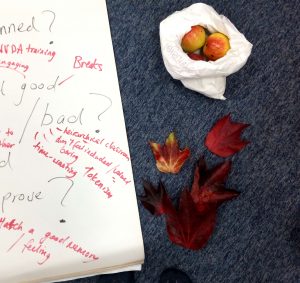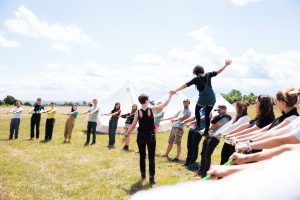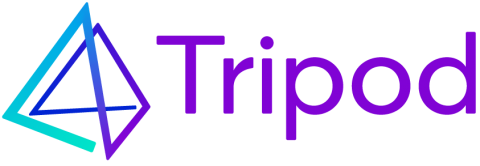Why we do what we do, and our vision for a better future
Tripod works for a just world, where we live together in mutual care for one another, all living things and the land. We envision powerful, joyful, and interconnected communities that navigate differences and learn together through challenges.

Tripod builds the power of social movements tackling the root causes of injustice in Scotland and beyond. As a collective of facilitators and educators, we connect people and develop skills to embody the liberated futures we’re fighting for. We seed active solidarity and strengthen strategic collaboration within and across movements.
Tripod’s theory of change outlines how we contribute to making change and moving towards a shared vision of a more just world. It grounds our strategic choices and is a working best-guess about how to use our skills and resources to bring about liberation.
The groups and networks we support are fighting against many forms of violence caused by extraction and exploitation for profit. Across the UK, growing numbers of people live in poverty, struggling for secure housing, food and healthcare. Responsibility for rising inequality is deflected from the state and industry, while fascists escalate tensions between communities incited to blame one another over those in power. Everywhere we see extractive economic practices continue to hide behind false solutions and lead us further towards devastating ecological crises. The communities that are least responsible for these crises of racial capitalism disproportionately feel their impacts. A cascade of displacement, exploitation of our living world and other colonial violence exacerbates conflict and involuntary migration while borders are increasingly militarised. Marginalised and racialised communities and others fighting for change, face state violence in the form of exclusion, policing and incarceration. Still change is inevitable, as the status quo shows more and more cracks. In the midst of this, we have opportunities to shape different worlds.
There has never been a greater need for powerful mass movements uniting across social and climate justice demands. Movements are growing, but we see cycles of burnout and attrition due to the precarity caused by capitalism and the painful replication of systemic oppression within our organising. We observe groups and movements working in silos, focused on their own issues and tactics, competing for limited resources and attention, and atomised by explosive conflicts. The injustices that our movements aim to address interrupt our potential for building solidarity and undermine collaboration for systemic change. We need movements with the collective power and imagination to win radically different futu
We see ourselves part of a wider movement ecology in Scotland and beyond, and prioritise sustained collaboration. We strive to be in caring and accountable relationships with those directly affected by systemic oppression, and those addressing its root causes. In particular, racialised and migrant communities, working class and disabled people, youth, queer and trans folks and communities impacted by fossil fuel infrastructure and the climate crises.
We are embedded in movements, and work alongside grassroots collectives, community groups, campaigning organisations, co-operatives, unions and charities fighting for social and climate justice.
Tripod will strengthen and sustain powerful movements for liberation that embody an irresistible vision for a more just world. Within these movements, groups centre joy, care and healing, and subvert systems of oppression, both internally and externally. Together they build collective power, praxis and strategy, share cycles of action and reflection and work in creative solidarity across struggles to create a world beyond our most radical imagination.

Liberatory education
Facilitation for groups & movements
Strengthening the movement ecology
another world is possible
We don’t wait for the future to build the world we want, we aim to embody non-hierarchy and sustainability in the ways we work for change. Prefiguration means we build alternative futures in the present and to effect political change by not reproducing the social structures that activists oppose.
“Direct action, simply put, means cutting out the middleman: solving problems yourself rather than petitioning the authorities or relying on external institutions. Any action that sidesteps regulations and representation to accomplish goals directly is direct action..” Crimethinc
“Just as direct action directly confronts systems of injustice, our approach challenges traditional education, confronting the beliefs, conflicts, and oppression that keep leaders and groups from being their most powerful – that’s why we call it Direct Education.
Direct education is about liberation and empowerment. Unlike traditional education, which gives all the expertise to textbooks and teachers, Direct Education invites the wisdom of people’s own experience. The practice comes out of popular education traditions . . . and builds on it”
Facilitating Group Learning: Strategies for Success with Diverse Learners – George Lakey
Intersectional feminism is inclusive of all genders and races, recognising the complexity of people’s experiences of the world cannot be reduced to just one aspect of their identity or experience, that those experiences intersect. It sees the intrinsic connection of oppression, and the interlinked forces of capitalism, imperialism and patriarchy which stand between those intersections and liberation.
Anti-capitalism – the neoliberal world we live in is harmful to all. Small reforms, green-washing, or tech solutions are not the answer – we are fighting for a world that does not centre profit and exploitation, in which classist structures are obsolete.
Climate justice – Broader than mere environmentalism, a justice lens considers also the human impacts and injustices, especially migration, historical context, and the differing class and geographical responsibility for the climate crisis.
Disability justice – A disability justice approach challenges all forms of ableism inherent to capitalism and the value placed on bodies and their productivity.
Community and labour organising is about people who are embedded within their place of work or community coming together in those places around shared struggles, building leadership from within, and generating power from the grassroots to demand large scale transformative change.
Organising – Migrants Organise
The fight for prison abolition is a struggle for collective liberation: a transformative vision of a safer world, in which communities are free of the threat of incarceration and punishment.
Brick by Brick – Cradle Community
Systems analysis complicates simplistic narratives about how change happens, and allows access to think differently about strategies to transform root causes and see change in the connected world we live in.
Thinking in Systems – Donella Meadows
Leverage Points: Places to Intervene in a System – The Donella Meadows Project
“Movement ecology frees us from the burden of trying to embody every theory of change ourselves; it allows us to value our unique role in the ecology while being in collaboration and mutualism with others” – NEON, Movement Builders Participant Guide
From our colleagues at Navigate: “having clear, explicit systems that work for everyone is key to creating a safe, collaborative and thriving environment” to allow our groups and movements to work for change.
Non-violent communication (NVC) has been described as a language of compassion, as a tool for positive social change, and as a spiritual practice. By supporting the shared understanding of needs, the NVC framework helps us to connect across difference and move through disagreement and conflict.
Co-operatives are structures that centre workers in decision-making and move power away from bosses and hierarchies to those who are affected, and will implement them. Horizontal organising empowers communities to have control over how and what they do, without centralising power with appointed leaders.
A short guide to Co-operatives – Seeds for Change
Co-op values and principles | Co-operatives UK
For more about our networks, sources of inspiration & other supports, see our resources page.
Donations from those of you with social and financial capital help us to fund vital work with grassroots groups that don’t have access to funding.

